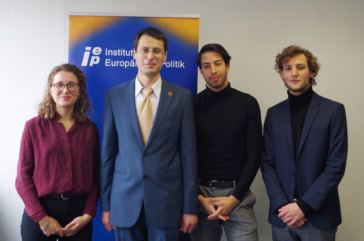10th Ukraine Breakfast Debate “Confrontation in the Azov Sea: Possible Consequences for Ukraine’s Political Future and Security Situation” with Petro Burkovskyi

On 25 November 2018, Russian military vessels attacked three Ukrainian boats that attempted to pass the Strait of Kerch on their way to the port of Mariupol. Thereby, Azov Sea moved into the focus of international media and public attention for the first time. Due to the high level of interest these events created, we devoted our 10th PAIC Ukraine Breakfast Debate to the topic “Confrontation in the Azov Sea: Possible Consequences for Ukraine’s Political Future and Security Situation”. Our guest speaker Petro Burkovskyi, security expert at the Ilko Kucheriv Democratic Initiatives Foundation (DIF, Kyiv) and Head to the Center for Advanced Russian Studies at the National Institute for Strategic Studies (NISS, Kyiv) shed light on the recent developments in the Azov Sea and their political and security implications for the upcoming months. The presentation was followed by a commentary by Dr. Susan Stewart, Senior Associate at the German Institute for International and Security Affairs (SWP, Berlin) who evaluated the European perspective on the issue.
The incident in the Kerch Strait is only the latest link in a chain of aggressions in the Azov Sea, Petro Burkovskyi argued. These developments had to be evaluated in the strategic context of the Russian-Ukrainian conflict. The conflict constitutes an existential challenge for both countries, whereby Ukraine is clearly in the weaker position. Against the backdrop of this ongoing conflict with the most recent escalation in the Kerch Strait, the Ukrainian public becomes increasingly sceptic towards the Russian influence. Especially in the light of the upcoming presidential elections in Ukraine, this created a new momentum for political actors to introduce more severe security policy. The declaration of the martial law in its current form has thus been met with relative trust and support by the general public[1]. However, according to recent opinion polls, less than half of all Ukrainians would say that restrictions of fundamental rights and violations of human rights by the military could be justified for the sake of security. The closer the respondents live to the conflict zone, the greater the justification for such restrictions, show the polls. Still, Burkovskyi emphasised, the political dimension of the introduction of the martial law should not be overestimated, as it cannot be easily abused by the political elite as long as they do not have the support of the public.
Dr. Susan Stewart, SWP, expresses more scepticism on this account. One should not underestimate the political instrumentalisation of the martial law and its effects, especially regarding the 2019 presidential elections. Stewart emphasised that President Poroshenko clearly had made an effort to influence the election campaign. This became in particular evident in the scale of Poroshenko’s initially suggested version of the martial law. Moreover, he sees the great potential of benefits for his election campaign which runs under the slogan “Army! Language! Faith!”. Dr. Stewart regards the incident in the Kerch Strait less as a being only a link in a chain of incidents but as turning point in the conflict, given the fact that Russia for the first time within the whole conflict admitted to be directly militarily involved. This is why the rather reluctant European response is incomprehensible, according to Stewart. Despite emphasising the utmost concern about the recent developments and restating the importance of Ukraine’s territorial integrity and sovereignty, there seems to be very little prospect for further sanctions on Russia from the European Union. This stance is further aggravated by on-going EU-internal and domestic issues in member states such as the Brexit or the latest unrest in France.
We are looking forward to more insightful and lively breakfast debates in 2019 and want to thank all our guests and partner organisations, the Ilko Kucheriv Democratic Initiatives Foundation (DIF, Kyiv) and the think tank-initiative „think twice UA“ (Kyiv) for their active participation and the Federal Foreign Office for their kind support. The Ukraine Breakfast Debates take place within the Project “Platform for Analytics and Intercultural Communication” (PAIC), which aims at supporting the Ukrainian think tank landscape, transferring knowledge on current socio-political processes in Ukraine to Germany as well as fostering the exchange between German and Ukrainian research institutions.
[1] Public opinion polls on this question are currently conducted by the DIF and concrete results are awaited in the upcoming weeks.


